- Home
- Ian McDonald
Out on Blue Six Page 10
Out on Blue Six Read online
Page 10
“Clear the floor.”
“Block the move.”
“Could you give me some sort of rhythm on that machine?”
“Time this, will you? It shouldn’t run over two thirty-five.”
“All right. Dancers … dancers, please …”
“What about him?”
“Whom?”
“Our newly co-opted mystery member over there. Citizen West.”
It had been a joy for him to be invisible, to have been, lost in the wonder of something coming out of nothing.
“He’s not trained. He can’t do anything.”
“Neither could most of us when we joined.”
“Then we build the whole performance around him.”
“You what?”
“You make him the center of the performance.”
“No, no, I see how it might work. The still center, the paradox of centering a performance around someone who cannot perform.”
“Precisely. Think you can handle one of these things?” Kilimanjaro West was thrown one of Kansas Byrne’s magical music boxes.
“For Yah’s sake!” exclaimed the musician, but the music box was already safe in Kilimanjaro West’s hands.
“I am part of the performance?”
“You a Raging Apostle, you is the performance.”
Joshua Drumm clapped his hands and the rehearsal began. The dance swept in and carried Kilimanjaro West away. Experience he had sought, experience he now found, unlike any experience before. Sounds and shapes and colors moved about him and he was part of their movement (though he could not understand how he contributed to the spiral of light and motion) and their movement was part of him, all moving, all spiraling; he was bewitched, bewildered, beguiled, bedazzled.
Then: “Take five!”
“Means a break, Kaydoubleyou. Five minutes.” Wiping down musky woman-sweat, Kansas Byrne stretched herself over a chair beside Kilimanjaro West, still dazed, amazed, bemused. She craned back her head, puffed, shook droplets of sweat out of her hair.
“So,” she said, looking up into the canopy of interwoven branches that roofed the dancing floor. “You want to trade?”
“Pardon?”
“Lives. You want to swap your life for my life?”
“I’m very sorry …”
“No, I’m the one should be sorry. I do that, I tend to evolve my own private little expressions and similes and then expect everyone else to understand what I’m saying. You want. To trade. Biographies?”
“I’m afraid that would not be a very good trade,” said Kilimanjaro West. “I have so little to tell.”
“Cousin, a gram of mystery is worth a kilo of reality in this society.”
“Very well. If you like. But as I said, there really is not very much to tell, and what there is, is not all that interesting.”
“But what there isn’t, what’s implied, what’s hidden, is. To me. I don’t want facts, I want feelings, I want to understand what it’s like to be born knowing nothing, but fully aware.”
“Then you have a deal.”
“Shoot, Kilimanjaro West.”
So he told her, of all the things that had happened to him, and of all the things he thought he remembered of a before-time, and of how it had felt in that cold room with the condensation trickling down the window, and under BeeJee &ersenn’s glass roof with the rain pounding down, and standing in Neu Ulmsbad Square with silver Mylar angels pouring out of the architecture. And when he had told all this, Joshua Drumm called, “All right, cizzens, let’s get back to it. Sixty-eight hours until we hit the streets of Wheldon, so let’s rehearse! Take two, and I want to see that dance section tighter and brighter. A lot tighter and brighter.”
Kansas Byrne winked as she stretched stiff muscles and began limbering up.
“I’ll fulfill my part of the contract next break we get,” she said. Kilimanjaro West found that wink stayed oddly in his mind all the rest of that day’s rehearsals.
Sighs and sweat. The wheel whirled again. But this time he began to see the order underlying it, as if some artistic gravitation were being spun out of the wheeling sensations, impressions, experiences, which drew the shapes, sounds, visions into orderly entities. He saw how what he was doing with his little rhythm box contributed to the whole; he was just beginning to grasp the shape of the whole, a human representation of the vortex that spun chaos into order and back into chaos again when Joshua Drumm’s voice called time. “Okay, cizzens, you’ve worked for it. Take five!”
Over cups of protein-mush soup (“All we could filch from the dispenser down the street”) Kansas Byrne sat with him and they shared a soya bread roll and she upheld her part of the bargain.
With the following story.
THIRD-DEGREE BYRNES
AND RADIO KANSAS
So, what to tell about our girl rebel-rebel? Born such and such, fostered such and such, educated such and such … this is only a take-five over a cup of tofu soup, not enough time here for the full autobiographical from conception in the back of a props van parked behind the Purple Helix Improvisational Theater Co-op to Top o’ the Class of ’48 at Chrysanthemum House Holistic Arts Community … no, hold on, better stop right there, rewind a little, swee-oopbiddlie-oop squidididilie … at the point where the fertilized egg in Jolanda Byrne’s womb splits (as it does in 5.25% of human conceptions) into twins. And we’d better stop again at that moment in the North Annency Childwatch Crèche when Citizen Eduardo Giambatisto enters with the results of the Postnatal Aesthetic Apperception and Attitudinal Tests (the dreaded Treble-A Ts), which sends tlakhlet one to the Chrysanthemum House Holistic Arts Community and tlakhlet two to the Archimandrite Anaxemides XXIV Conservatorium of Music.
And having stopped there and there, now you can fast forward (suqeediddlie oppwoopbiddlie iddlie ooop) to the annual presentation of awards for unparalleled excellence in the Multidisciplinary Performing Arts and the Big Bash the night before Kansas Byrne leaves Chrysanthemum House to join the Triangular Banjo Geopolitic Society Improvisational Performance Arts Group. When I say bash, you’ve got to remember that these are tlakhs we’re talking about, raised from birth to live, love, eat, drink, breathe, shit art, so to the usual drinkies, druggies, sex, and food you’ve got to add dance, live music, extemporized poetry, improvised comedy, performance sex, gourmet cookery, creative vandalism … now you’ve got the picture. Yuh, I agree with you, that is some kind of bash.
Best the Chrysanthemum House had seen in decades.
Rather a waste, really. That big send-off. Because Kansas Byrne and the Triangular Banjo Geopolitic Society did not compat. Despite the figures and the ratings. They just did not work together. The problem was she was just too damn talented.
Why not do it this way, take it like this, no no no, that’s dead, static, boring, what if we do it like this … what was galling to the Triangular Banjos was not that their newest member suggested; suggestion was the nature of their art; what sandpapered the nipples was that her suggestions were always the best.
After three months Kansas Byrne applied for, and received, a grant from the Department of Arts and Crafts to form a one-woman performance art group working in interactional microdrama with nonselective audiences.
It is entirely possible that the Department of Arts and Crafts did not understand what Kansas Byrne meant on her application; had they known the shape her performances would take, they would never have considered funding. They might even have recommended Social Harmony Counseling. But that’s the way it is with Benign Incompetence; if you will place people in the jobs that make them happy rather than jobs they are necessarily good at doing, there are always going to be these little misunderstandings.
(How we doing for time? Not bad, but don’t hang about too long …)
With her grant in her pocket, our heroine hunted down an accomplice, a Scorpio she knew out on his blue six year who had gotten into trouble wire running. In return for her acting as his guarantor of safe behavior to the MiniPain, he took
on the job of her technical assistant. After two months’ planning and preparing and hardwiring, “Third-Degree Byrne” was ready to take its art out where its founder thought it should be: on the streets, among the peoples of Great Yu. Artistic comprehension and apperception ratings? Toilet paper! Art was the province and property of all the people, not merely those whom the Compassionate Society said could properly enjoy it.
So.
For two weeks she rode the cablecars through the deep, dark canyons dressed in a head-to-toe video bodystocking displaying black-and-white scenes of starvation, war, and holocaust from a file on pre-Break visual history she’d had her Scorpio friend pick. And when the nona dolorosas made her frown beneath her head-mask, she had the good doctor M’kuba adapt a neural interface corona to act as a radio transmitter and with chrome power-wheels on her feet she went skating through the rain-wet nights broadcasting her thoughts, her feelings, her impression of everything she came across to anyone tuned to her wavelength. Naked except for startling body paint and a brass G-string containing a pheromone enhancer, she spent several weeks riding the municipal trams and sent close to a million commuters home at night with a thorn in their hearts, wondering just what it had been about that tlakh girl with the dark hair and the dark eyes that they should feel such a keen sense of loss. She tried to reach as many lives as she could with her art, to touch, and change, and then pass on to other lives. For a year she devoted herself to Third-Degree Byrne, then, suddenly, she went cold. The tlakh community waited. Nothing. As they debated and deliberated on their favored daughter, she was passing through a time of reevaluation.
You can reach, you can touch, oh, a million lives, but you can never see how your touch has changed each of those million lives, for you must always be upward and onward, across the street, along the wire, down the tube.
So our heroine, our girl rebel-rebel (though at the time she thought of it only as healthy nonconformity) did a volte-face. She locked herself up in a cellar in Four Solitudes with her accomplice, and for four months they conceived and gestated and birthed Total Media Theater: A New Aestheticism. No more reaching, touching, every soul. She worked with unique audiences, never more than two carefully selected individuals whom she could observe for change and reaction to her art. Like Siddhi Befana upon her solstice rounds, Kansas Byrne would step out of the midnight rains on the Rue Saltimbanque to bestow late-night singletons with mysterious gifts; Dada-esque creations consisting of layer upon layer upon layer of amazement and amusement and wonder and horror and stupefaction and excitement and strange disease, concealing, at their centers, a video recording of the reaction of the recipient of the last one of her gifts.
But even as the videocam-toting dark-knight avatar of junque aesthetic and strange fortune, she was dissatisfied with her work; there was never the desired immediate reaction, the longed-for absolute spontaneity. Once again she withdrew with her co-conspirator to produce Total Media Too—thirty seconds of laser-intense immersion in emotional stimuli utilizing every possible technological grace: lighting, illusion, dance, drama, computer graphics, pyrotechnics, hallucinogens, direct manipulation of the emotional centers of the brain by using the conductivity of the skull to receive narrowcast datalynk material. She picked her times and places and audiences with the fastidiousness of a vestal virgin, the stealth of an assassin. Comings, goings, dates, times, movements, all observed and recorded, while at the target site Dr. M’kuba shoehorned vanloads of technology into windowboxes, fire escapes, public drinking fountains, municipal shrines. It fringed on the PainCriminal. “Privacy infringement,” her famulus never tired of advising her, so before she went on a hit she always took care to leave it under the bed. And then she would appear, out of nowhere, out of somewhere, out of anywhere, an angel, a demon, a something in between better than either, in fire and light and darkness and music and silence and storm and peace and clouds and trees. And for thirty seconds, O best beloved, the specially selected audience would gape and goggle or whatever was appropriate to what Kansas Byrne was offering, and when the smoke had cleared and the last firework had burned out and the last drip of red spray gel had slipped into the rain-running gutters, they would fall to their knees and say thank you, oh, thank you, it was wonderful, wonderful, how can I ever thank you enough?
This was quite unnecessary; just for them to have been there was all the thanks Kansas Byrne needed.
She had been tracking the target for three days now. (Please note change of style, O best beloved, times is getting short; any moment Joshua Drumm is going to clap his hands and it’ll be curtain down …) He was a mystery, this one, she could not accurately log his movements. There were places he went, things he did, wheres and whens and whos he somehow managed to keep hidden from her. And that made him all the more valuable; coupled with the fact that he was one of her own caste. She had long been curious to see how a fellow tlakh would respond to Total Media Theater. So; the target was selected. The site was chosen and prepared: a cobbled alley between the window-speckled walls of two co-habs that seemed to go up and up and up forever. Trash cans. Cats. Rats. Raccoons. Rain. Midnight. The appointed hour was nigh in seconds. From her perch on the third-level fire-escape balcony, Kansas Byrne watched the audience rendezvous with the event. Two steps more and he would hit the spot … Her finger hovered over the stud that would fire the lasers …
And the world exploded around her! Fireworks! She was cocooned within forests of silver sparks, music, lights! … and down in the alley, on her spot, with the cats and the rats and the raccoons and the big rain, the slight, bearded tlakh who had been her target was transformed … into something light and bright and brilliant, something dwelling effortlessly in the dimension between dancing and flying.
She was overwhelmed … and then she laughed. Uproarious laughter, joyous laughter, in the rain, on the third-level fire escape. She pressed the button, and together they performed for each other’s delight, down there in the cascades of silver sparks and lasershine; they danced, caught up between worlds, for thirty seconds, thirty years, thirty eternities … until the last hologram flickered out of ephemeral life, until the last roman candle guttered down the rag end and the stench of damp gunpowder …
Only then did they see the faces in the window-speckled walls, hear the fearful voices, and in the distance, the howl of Love Police sirens. But there, on the empty stage, they bowed to each other out of admiration of each other’s artistry.
“Kansas Byrne,” said the girl rebel-rebel from Chrysanthemum House.
“Joshua Drumm,” said the thin, bearded choreographer. “You’re pretty good, you know.”
“You’re not bad yourself,” said Kansas Byrne, and the Raging Apostles were born.
“All right, all right, all right!” bawled Joshua Drumm, still burning after twelve hours of rehearsal with the same constant, nuclear energy. “Let’s do it again. Thunderheart, Devadip, tighten up that fan exchange—it’s slack. Slack! I want it sharp, snappy, not some Municipal Music Hall juggling act. This is art, and if you have to hurt for it, hurt! Hurt hard!”
This time was the best yet. Now that he no longer had to concentrate totally on just doing what he was meant to be doing, Kilimanjaro West was able to contribute more than what was circumscribed by his scripted, plotted part. Carefully, thrilled and anticipating, he began to experiment with his machine, matching sound ever more closely to mood and action, observing how that mood and action in turn responded to his sound in a continuum loop of action to reaction to action once again.
“Okay okay okay, take five! That’s a lot better. A lot lot better. Cizzen West, Kilimanjaro, whatever the Yah you call yourself—that was good.” Reading the pleasure on the newcomer’s face, Joshua Drumm added, “but don’t get too clever, comrade. You’ve a lot to learn.”
That is a true statement, thought Kilimanjaro West.
Kansas Byrne flopped down on the livewood floor beside him, lay panting, staring up at the leaves.
“Sometimes I wish I’d st
ayed with the Triangular Banjos; it was never as hard work as this, and you always had enough to eat.”
“Think of what you would have missed,” ventured Kilimanjaro West.
“True. True, true, true, Kaydoubleyou.” Steam rose from her rehearsal costume.
“I’m interested in the others,” Kilimanjaro West said at length, “how they came to be Raging Apostles. I’ve heard your story, what about theirs. His?”
“Who you pointing at? I’m too tired to get up.”
“Thunderheart. The … trog, is it?”
Kansas Byrne sighed. “All right, but don’t be expecting anything too grandiose, I’m all in. Thunderheart, in three lines: Born to two wingers, co-opted into the Grundy Street clan of the trog caste after adaptive surgery. Like most ’postles, the MiniPain got him all wrong and put him in the wrong clan; something to do with his tail, I don’t know what, I’m not terribly up on trog philosophies; whatever, it got him three months counseling, then he appealed to the Ministry for relocation. Now, that’s always fatal, and one day we were doing a show near his roost, and after we’d packed up, there was this shy-looking trog standing there twisting his tail over his hands, saying, ‘Do you, er, think it might be possible for me to join?’
“Know how he got his name? First thing the clan Eldest Namer saw when he took Thundie-junior up onto the high steel to show him the world. Good thing it wasn’t a Thursday; there’s a pair of wingers in the apt across the alleyway, and when they get together on their little Thursday trysts they always keep the curtains open. Lucky not to have had a much shorter name altogether. Hell of a system, isn’t it?”
“And him, Devadip, the zook, isn’t he?”
“Fashion fever, Kaydoubleyou. Cardinal rule of zookhood is never fall out of step with the herd. Our Deva was the exception to the rule; one day he decided to flush all his designer’s threads down the john and turn up at the local Salsa Klub in a little Latino number he’d run up himself. Got him barred from every danceria on the Chinzo Strip, between outrageous fashions, and dancing his own dance, and drinking his own cocktails, and deliberately talking about anything except what was that week’s fashionable topic. Half the club teraphim in the prefecture have him memorized, and barred. Bounced more times than a racketball. Finally it got so even his famulus, a slouch hat, would you believe—zooks are always getting new famuluses assigned to them because the fashion changes so fast—was giving him such a pain that he flushed the thing down the john—and came and joined us.”

 Empire Dreams
Empire Dreams The Menace from Farside
The Menace from Farside Luna: Moon Rising
Luna: Moon Rising Moon Rising
Moon Rising Desolation Road dru-1
Desolation Road dru-1 Empress of the Sun
Empress of the Sun Ares Express dru-2
Ares Express dru-2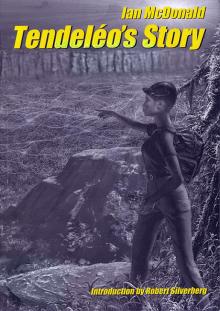 Tendeléo’s Story
Tendeléo’s Story River Of Gods
River Of Gods Luna
Luna![Cyberabad Days - [River of Gods 02] Read online](http://i1.bookreadfree.com/i1/03/29/cyberabad_days_-_river_of_gods_02_preview.jpg) Cyberabad Days - [River of Gods 02]
Cyberabad Days - [River of Gods 02]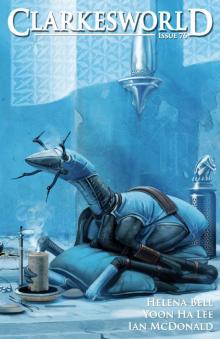 Clarkesworld Magazine Issue 76
Clarkesworld Magazine Issue 76 Brasyl (GollanczF.)
Brasyl (GollanczF.) Scissors Cut Paper Wrap Stone
Scissors Cut Paper Wrap Stone Chaga
Chaga Time Was
Time Was Cyberabad Days
Cyberabad Days Be My Enemy
Be My Enemy Changa
Changa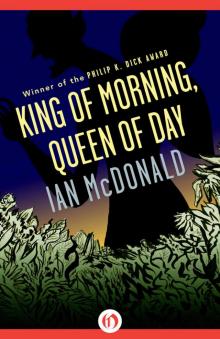 King of Morning, Queen of Day
King of Morning, Queen of Day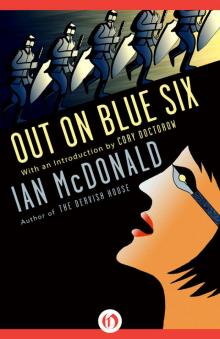 Out on Blue Six
Out on Blue Six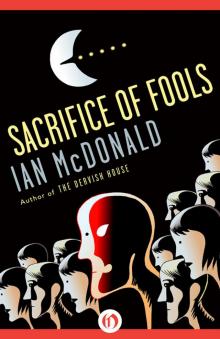 Sacrifice of Fools
Sacrifice of Fools Desolation Road
Desolation Road Luna--Wolf Moon--A Novel
Luna--Wolf Moon--A Novel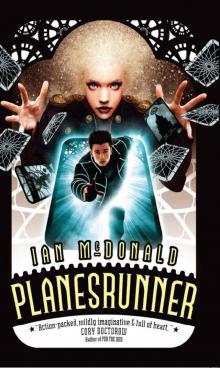 Planesrunner (Everness Book One)
Planesrunner (Everness Book One) Ares Express
Ares Express